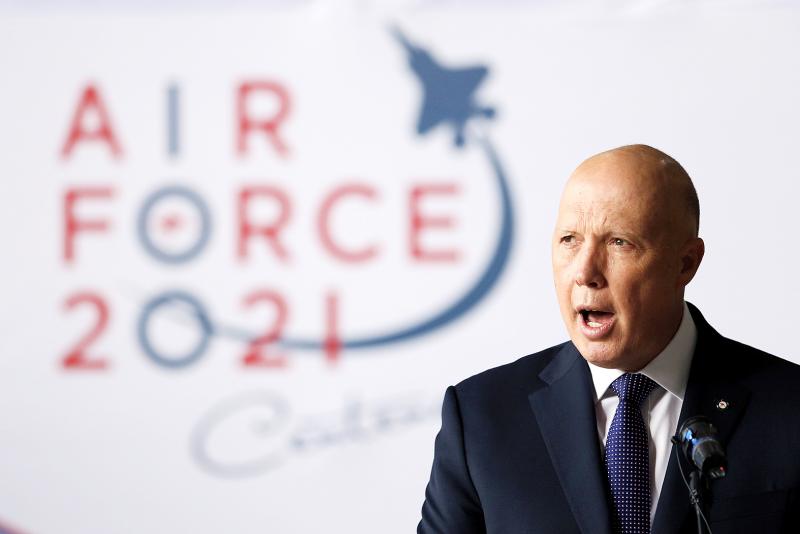Australian media yesterday cited Australian Minister for Defence Peter Dutton as saying that China would likely ramp up its pressure on Taiwan if Russia were to invade Ukraine.
A worsening of the crisis in Ukraine would likely have implications for security in the Indo-Pacific region, the Australian newspaper cited Dutton as saying.
One way that would manifest would be in China making greater encroachments on Taiwan, he said.

Photo: EPA-EFE
Dutton said an invasion of Ukraine would cause instabilities worldwide. Citing an example, he said that for a decade during the Cold War there was instability in Eastern Europe and other parts of the world had also been affected.
Dutton urged the Australian government to pay close attention to the situation in both Ukraine and in the Taiwan Strait.
Separately, the chairman of the Defence and National Security Policy Branch of the Liberal Party in New South Wales, Lincoln Parker, on Sunday said in an interview with Australia’s Sky News that a successful Russian invasion of Ukraine would “leave the door open” for a Chinese invasion of Taiwan.
“Indeed, [US] President [Joe] Biden is not committing as many troops as some would like,” he was quoted as saying.
Meanwhile, the Sydney Morning Herald yesterday published a report by US Studies Center senior fellow Bruce Wolpe, who said that if Russia invades Ukraine, China would likely seek to copy Moscow’s success.
“If Putin succeeds, and endures the sanctions and can tolerate the Ukrainian people’s uprising, and enjoys a resurgence of pride and glory across Mother Russia, [Chinese President Xi Jinping (習近平)] may want to copy that playbook for Taiwan. And sooner rather than later,” Wolpe wrote.

CHAOS: Iranians took to the streets playing celebratory music after reports of Khamenei’s death on Saturday, while mourners also gathered in Tehran yesterday Iranian Supreme Leader Ayatollah Ali Khamenei was killed in a major attack on Iran launched by Israel and the US, throwing the future of the Islamic republic into doubt and raising the risk of regional instability. Iranian state television and the state-run IRNA news agency announced the 86-year-old’s death early yesterday. US President Donald Trump said it gave Iranians their “greatest chance” to “take back” their country. The announcements came after a joint US and Israeli aerial bombardment that targeted Iranian military and governmental sites. Trump said the “heavy and pinpoint bombing” would continue through the week or as long

TRUST: The KMT said it respected the US’ timing and considerations, and hoped it would continue to honor its commitments to helping Taiwan bolster its defenses and deterrence US President Donald Trump is delaying a multibillion-dollar arms sale to Taiwan to ensure his visit to Beijing is successful, a New York Times report said. The weapons sales package has stalled in the US Department of State, the report said, citing US officials it did not identify. The White House has told agencies not to push forward ahead of Trump’s meeting with Chinese President Xi Jinping (習近平), it said. The two last month held a phone call to discuss trade and geopolitical flashpoints ahead of the summit. Xi raised the Taiwan issue and urged the US to handle arms sales to

State-run CPC Corp, Taiwan (CPC, 台灣中油) yesterday said that it had confirmed on Saturday night with its liquefied natural gas (LNG) and crude oil suppliers that shipments are proceeding as scheduled and that domestic supplies remain unaffected. The CPC yesterday announced the gasoline and diesel prices will rise by NT$0.2 and NT$0.4 per liter, respectively, starting Monday, citing Middle East tensions and blizzards in the eastern United States. CPC also iterated it has been reducing the proportion of crude oil imports from the Middle East and diversifying its supply sources in the past few years in response to geopolitical risks, expanding

Pro-democracy media tycoon Jimmy Lai’s (黎智英) fraud conviction and prison sentence were yesterday overturned by a Hong Kong court, in a surprise legal decision that comes soon after Lai was jailed for 20 years on a separate national security charge. Judges Jeremy Poon (潘兆初), Anthea Pang (彭寶琴) and Derek Pang (彭偉昌) said in the judgement that they allowed the appeal from Lai, and another defendant in the case, to proceed, as a lower court judge had “erred.” “The Court of Appeal gave them leave to appeal against their conviction, allowed their appeals, quashed the convictions and set aside the sentences,” the judges